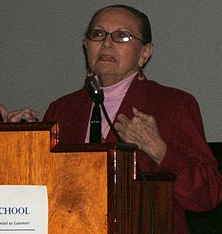Holocaust Survivor Shares Story with Students

Sonia Schreiber Weitz tells her story of survival to Medford High School students on Tuesday afternoon.
– Allison Goldsberry
Sonia Schreiber Weitz has happy memories of her early childhood, memories of spending time with her family on her grandmother’s farm in Poland, of sharing a bed with four or five other children, and waking up to the smell of freshly baked bread.
Then she remembers eavesdropping on the adults’ conversations when she was supposed to be asleep, and hearing discussions about how to get out of Europe to escape the Germans.
But strict immigration policies throughout much of the Western world left Weitz and her family and many others without a place to go.
“There was no way out, so we were trapped, and we were slaughtered.” Weitz said to an audience of about 400 students and faculty at Medford High School on Tuesday afternoon.
The Germans invaded Poland in 1939. Schools were closed, Weitz’s father had his business taken away, and Jews were herded into ghettos and were forced to wear armbands with the Star of David.
Weitz was just eleven years old.
Eventually, eighty-four of Weitz’s family members were rounded up and sent to Nazi concentration camps, and only Weitz and her sister Blanca survived.
Weitz and her sister spent time in five different concentration camps, including Auschwitz and Bergen-Belson.
There was the constant cold and the constant hunger; the forced labor; the separation from loved ones.
No one was allowed to have any personal items at the camps. Weitz’s poetry, which she started writing at a young age to help cope with the horrific conditions, was destroyed when she entered her first concentration camp.
From that moment on, Weitz composed poems in her head to help transport her from her harsh reality, and later published them in a book, I Promised I Would Tell.
Weitz’s poems mark her incredible story of survival- they tell the story of her mother being taken away to her death, a last dance with her father, and of her rescue by an African-American soldier at the end of the war.
Weitz is now co-founder and Education Director of The Holocaust Center Boston North, Inc., and she speaks about her experiences on behalf of Facing History and Ourselves, an education program that focuses on genocide and mass violence in history.
Weitz is angered by Holocaust deniers and she encourages people to take a stand against genocide to prevent it from happening in the future.
“I want you to above all not be bystanders. There is nothing worse for a victim than to be alone,” said Weitz.
Weitz recommended actions as simple as finding information online about the Darfur conflict and holding awareness sessions about the issue as ways to help.
More…